Marketing analytics is evolving at lightning speed, with new tools and technologies reshaping how businesses understand data. In 2025, choosing the right marketing analytics company will be more crucial than ever to stay ahead of the competition.
This article spotlights the nine most essential solutions that empower organizations to thrive in a data-driven world. We will compare each platform’s standout features, pricing, and how they tackle today’s diverse marketing challenges.
Ready to unlock actionable insights and boost your marketing performance? Let’s dive into the best analytics solutions for the coming year.
The Role of Marketing Analytics in 2025
The landscape of marketing analytics in 2025 is rapidly evolving, reshaping how organizations approach data and strategy. As businesses navigate a more complex marketplace, the role of a marketing analytics company becomes central to unlocking growth and competitive advantage.
Evolution of Marketing Analytics
In the past, marketing analytics focused mainly on basic reporting and historical performance metrics. Today, the transformation is evident as the typical marketing analytics company leverages artificial intelligence and predictive modeling. These advancements empower teams to anticipate trends, forecast demand, and identify valuable customer segments before competitors do.
This shift from reactive to proactive analytics means companies are no longer just tracking what happened. Instead, they are shaping what will happen next, using sophisticated algorithms and automated insights to stay ahead in a data-driven world.
Data Privacy and Compliance
The introduction of regulations such as GDPR and CCPA has fundamentally altered the way a marketing analytics company collects, processes, and stores data. Compliance is now not just a legal requirement but a core component of customer trust.
Marketing analytics company solutions in 2025 prioritize privacy-first architectures and transparent data practices. Features like consent management, anonymization, and secure data storage are standard, enabling brands to build loyalty while minimizing risk.
Omnichannel Integration and Real-Time Analytics
Modern marketing analytics company platforms excel at integrating data from a diverse range of sources, including offline purchases, digital interactions, and emerging channels like voice or IoT devices. This unified approach provides a holistic view of the customer journey.
Real-time analytics is another defining trend. Businesses can now react instantly to market shifts, campaign performance, or customer behavior. This agility enables more personalized experiences and rapid optimization across every touchpoint.
Actionable Insights and User-Friendly Tools
With enormous volumes of data available, extracting actionable insights is more critical than ever. A top marketing analytics company focuses on delivering clear, actionable recommendations rather than overwhelming users with raw numbers.
Self-service analytics tools have surged in popularity. These platforms are designed for both technical and non-technical users, featuring intuitive dashboards, drag-and-drop interfaces, and automated reporting. This democratization of data empowers entire teams to make smarter decisions, faster.
Industry Statistics and Brand Example
Recent surveys reveal that over 80 percent of organizations plan to increase their investment in analytics, citing improved ROI and customer engagement as key motivators. The global market for marketing analytics company solutions is projected to reach new heights, with AI-driven platforms leading the charge. For a deeper dive into these trends, explore the Marketing Analytics Trends for 2025.
Leading brands are already leveraging sophisticated analytics to deliver hyper-personalized campaigns. By unifying customer data and applying predictive models, they achieve higher conversion rates and stronger brand loyalty, setting the standard for success in 2025.
9 Essential Marketing Analytics Company Solutions for 2025
The marketing analytics company landscape is evolving rapidly, offering businesses a wealth of tools to harness data and drive smarter decisions in 2025. Selecting the right solution means understanding each platform's strengths, features, and target use cases. In this section, we break down nine leading marketing analytics company offerings to help you make an informed choice.
ApusNest
ApusNest positions itself as a marketing analytics company focused on actionable insights for e-commerce growth. Its pricing is flexible, offering a free report, a full report for a one-time $29 fee, and custom packages for businesses with unique needs.
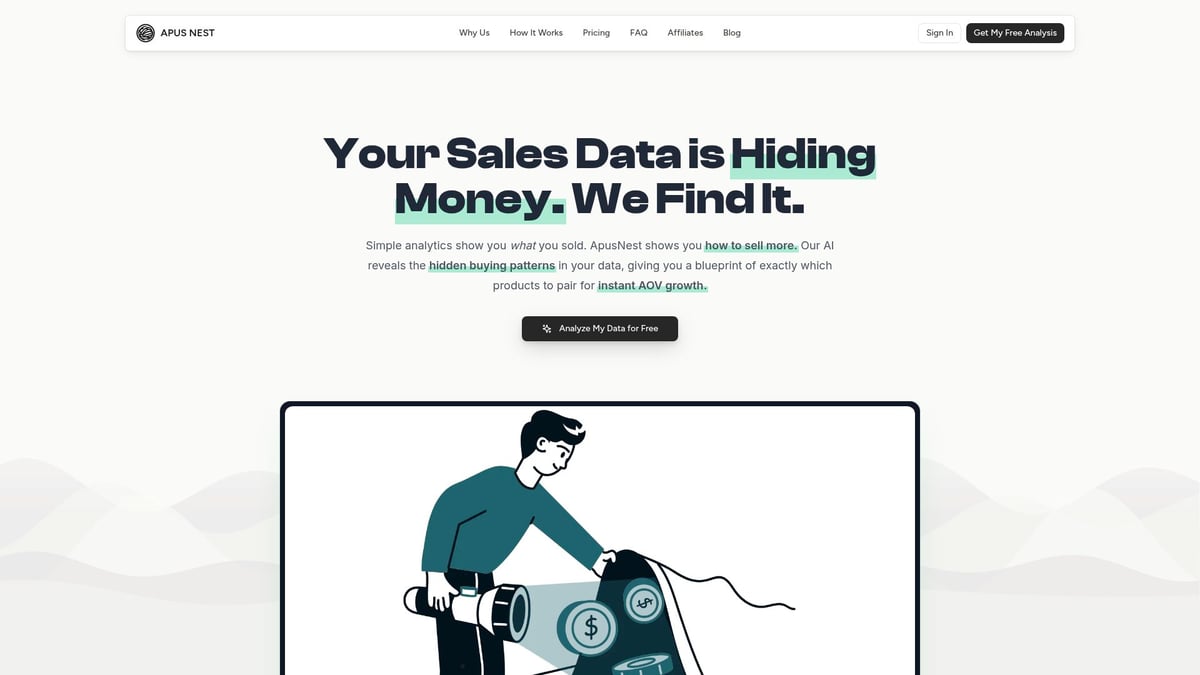
Core features include AI-powered market basket analysis, an association rules engine, interactive dashboards, CSV export, and tailored recommendations. These tools help users uncover hidden product pairings, optimize cross-selling, and boost average order value, all while prioritizing user-friendly design and data privacy.
A standout benefit is ApusNest's privacy-first, platform-agnostic approach, giving users full data ownership. The marketing analytics company streamlines integration with major platforms such as Shopify and WooCommerce, catering to SMBs and non-technical users.
Pros:
- Affordable, no subscription required
- Fast setup and easy to use
- Strong focus on privacy
Cons:
- Primarily for e-commerce basket analysis
- Not a full-suite marketing analytics company solution
For a practical look at how ApusNest's core features work, see this Market basket analysis example that demonstrates real-world value.
Google Analytics 4
Google Analytics 4 is a marketing analytics company solution that offers a free standard version and a GA4 360 enterprise tier with custom pricing. It enables cross-platform tracking with an event-based data model and integrates deeply with Google Ads and BigQuery.
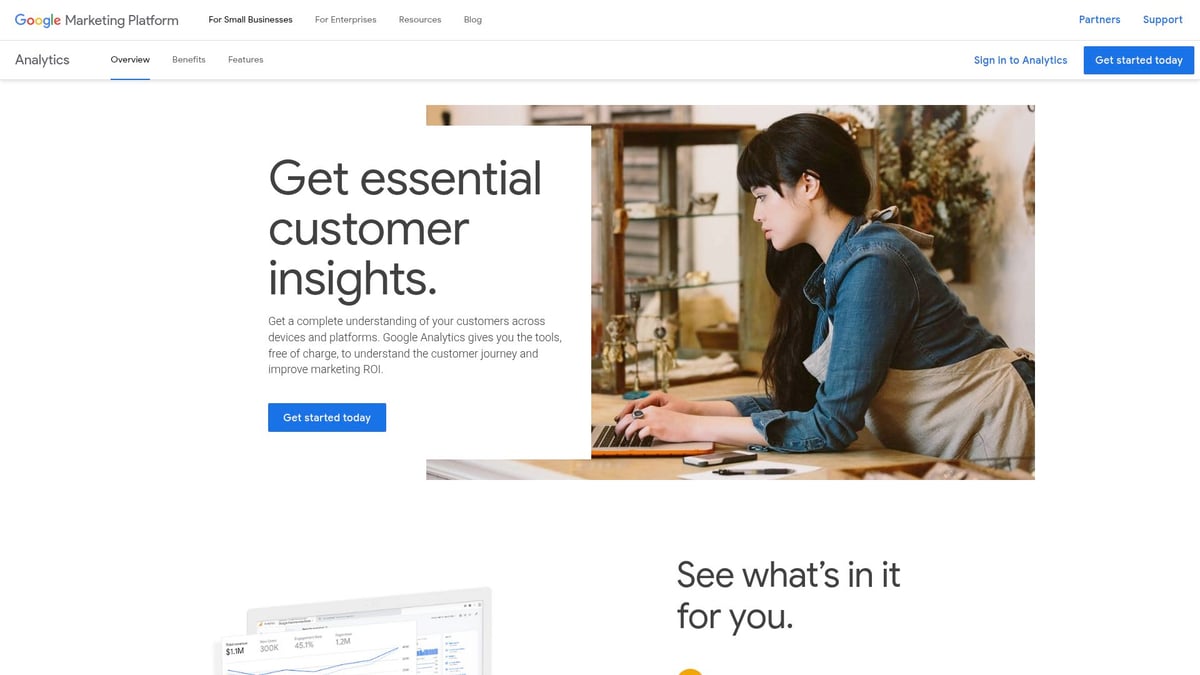
AI-driven insights and predictive metrics provide a unified view of customer journeys, making this marketing analytics company an industry standard. The platform excels in robust reporting and machine learning capabilities, helping businesses of all sizes understand user behavior.
Pros:
- Free tier available
- Powerful integrations
- Recognized as an industry standard
Cons:
- Steep learning curve
- Privacy limitations
- Sampling in large datasets
Google Analytics 4 is ideal for marketers and analysts who want actionable insights without high upfront costs, making it a versatile marketing analytics company platform.
Adobe Analytics
Adobe Analytics stands out as a marketing analytics company catering to enterprises seeking advanced capabilities. Pricing is custom, tailored to each business's needs.
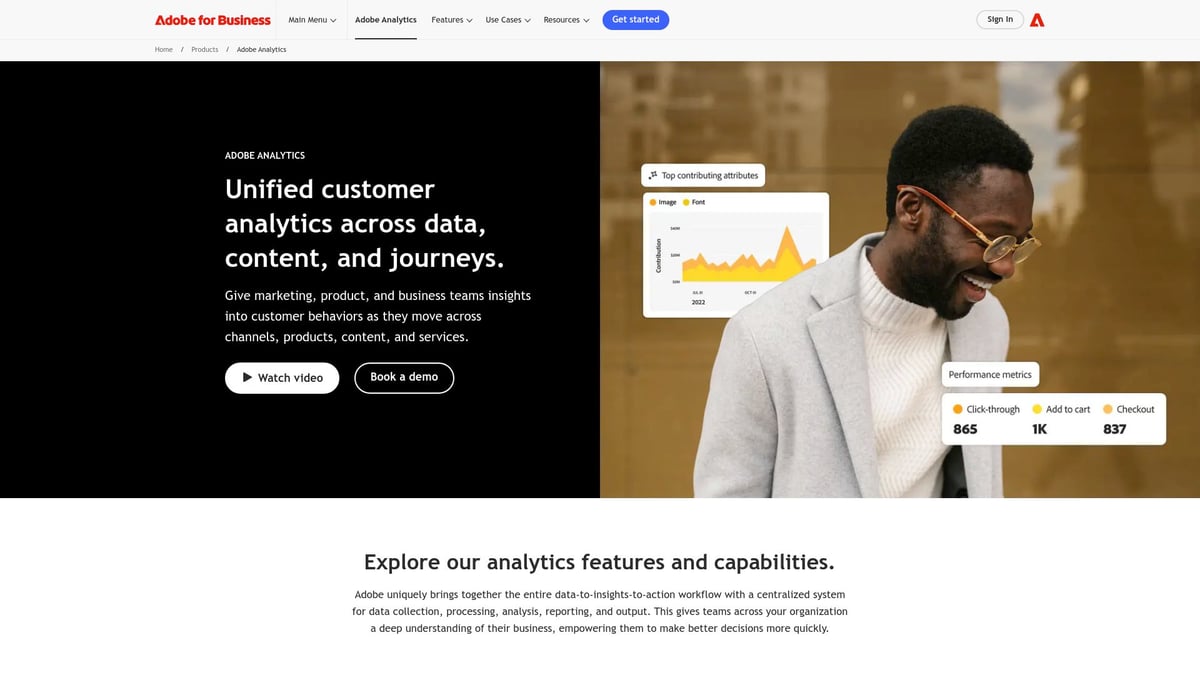
The platform offers real-time analytics, advanced segmentation, predictive analytics, and attribution modeling. Its customizable dashboards and AI-powered forecasting deliver deep customer insights, setting this marketing analytics company apart for those who demand granular control.
Pros:
- Highly customizable reporting
- Powerful visualization tools
- Strong enterprise support
Cons:
- Expensive for smaller businesses
- Requires training for effective use
With robust integrations into the Adobe Experience Cloud, Adobe Analytics is best for large, data-driven organizations that value comprehensive analytics.
Mixpanel
Mixpanel targets SaaS, mobile apps, and digital product teams as a marketing analytics company with flexible pricing: a free tier, Growth at $25/month, and custom Enterprise options.
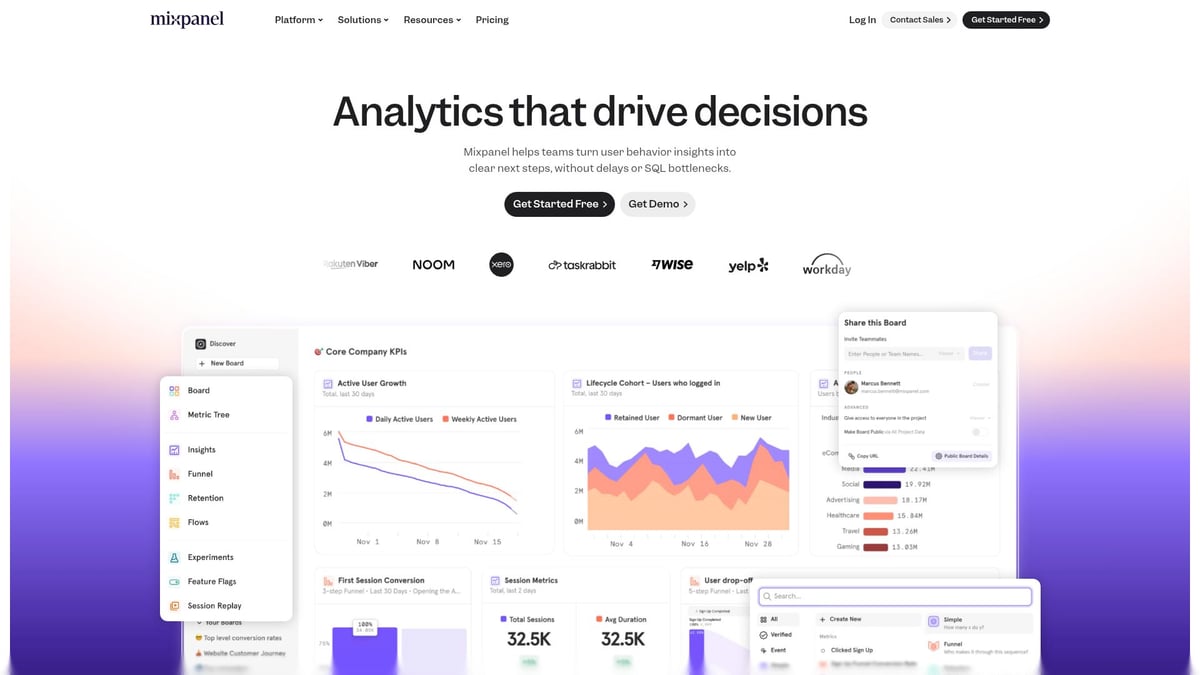
Its event-based tracking, funnel analysis, cohort analysis, and retention tracking provide a clear lens into user behavior. Real-time data and an intuitive interface make Mixpanel a marketing analytics company favored for optimizing conversion funnels and measuring engagement.
Pros:
- User-friendly and easy to set up
- Strong segmentation capabilities
- Flexible, scalable plans
Cons:
- Limited for non-digital products
- Advanced features have a learning curve
Mixpanel empowers teams to make informed product decisions, positioning itself as a go-to marketing analytics company for digital-first businesses.
Tableau
Tableau is a marketing analytics company known for its industry-leading data visualization tools. Pricing ranges from $70/user/month for Creator, $42 for Explorer, and $15 for Viewer.
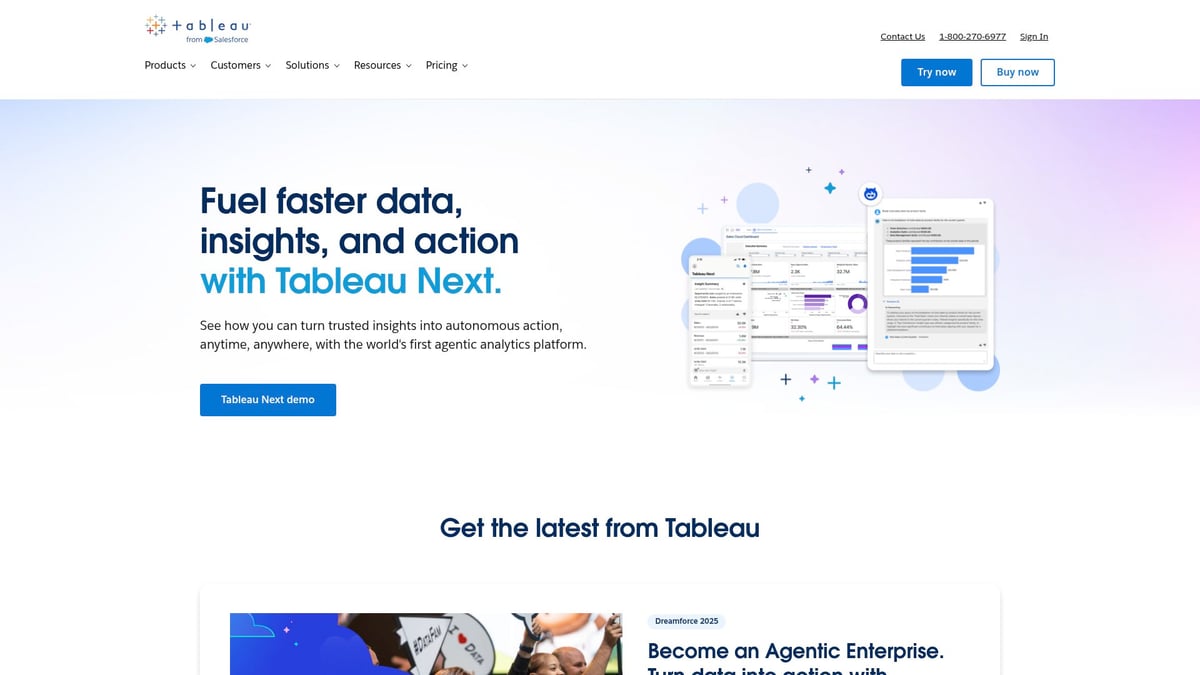
Advanced visualization, drag-and-drop dashboards, and integration with multiple data sources help users turn complex information into actionable insights. Tableau's marketing analytics company platform is highly scalable and supported by a strong community.
Pros:
- Powerful, interactive visuals
- Extensive third-party integrations
- Scalable for large teams
Cons:
- Can be costly for smaller businesses
- Advanced features require training
Tableau is best suited for enterprises and analysts who prioritize deep data exploration and sharing interactive reports.
HubSpot Marketing Analytics
HubSpot offers a marketing analytics company solution as part of its Marketing Hub, with plans ranging from Starter at $50/month to Enterprise at $3,600/month.
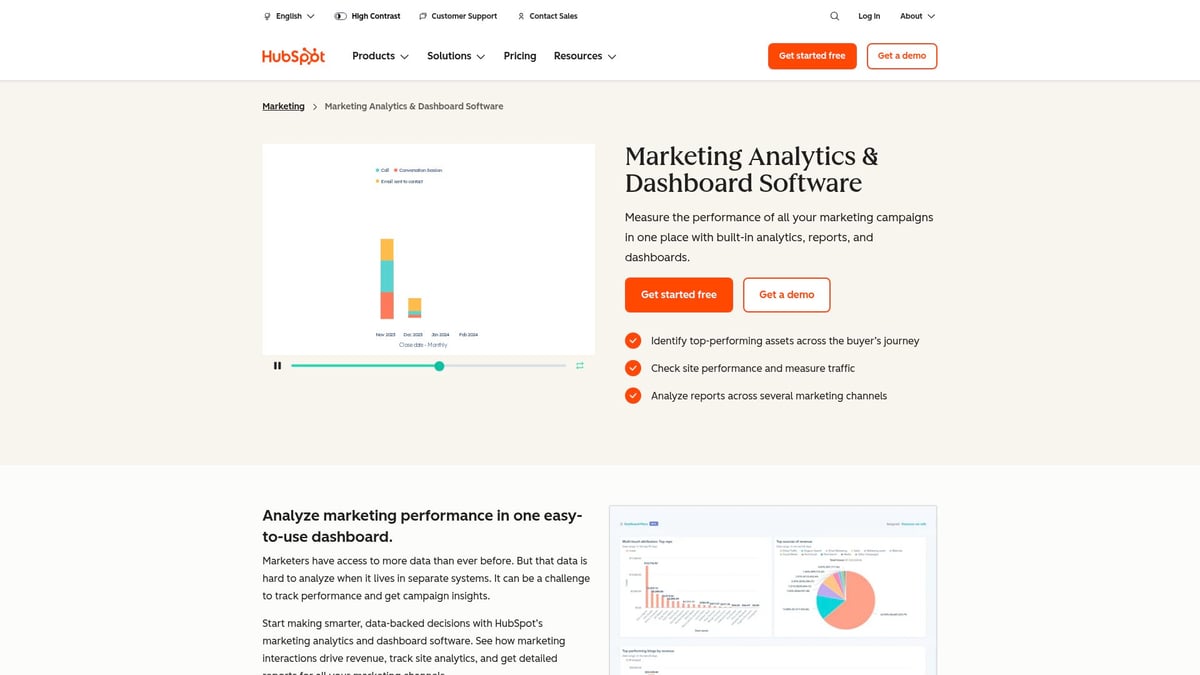
Core features include multi-touch attribution, campaign reporting, contact tracking, and ROI measurement. This marketing analytics company integrates seamlessly with HubSpot's CRM and sales tools, making it an all-in-one solution.
Pros:
- Unified marketing and sales platform
- Easy automation and integration
- Robust customer support
Cons:
- Advanced features locked behind higher tiers
- Can become expensive as needs grow
HubSpot is ideal for SMBs, inbound marketers, and agencies seeking simplicity and integrated workflows in a marketing analytics company.
Heap
Heap is a marketing analytics company that simplifies data collection with automatic event tracking and retroactive analytics. It offers a free tier as well as Growth and Premier custom packages.
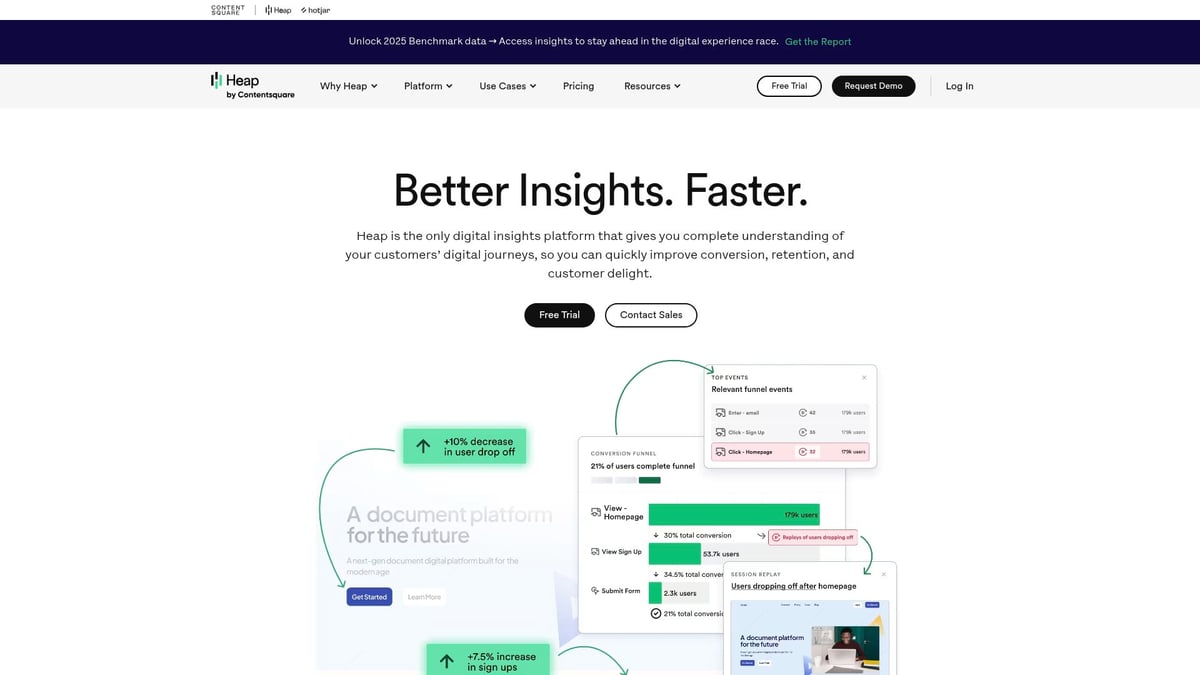
No manual tagging is required, and instant insights are available through user journey analysis and conversion optimization. Heap's auto-capture technology distinguishes it from other marketing analytics company solutions.
Pros:
- Fast, no-code setup
- Flexible and retroactive analysis
- Strong customer support
Cons:
- Custom pricing can be unclear
- May overwhelm beginners with features
Heap suits product teams, marketers, and SaaS companies that need immediate, in-depth analytics without heavy technical lift.
Kissmetrics
Kissmetrics is a marketing analytics company focused on customer lifetime value and growth insights. Pricing starts at $299/month (Silver), $499/month (Gold), and custom Platinum tiers.
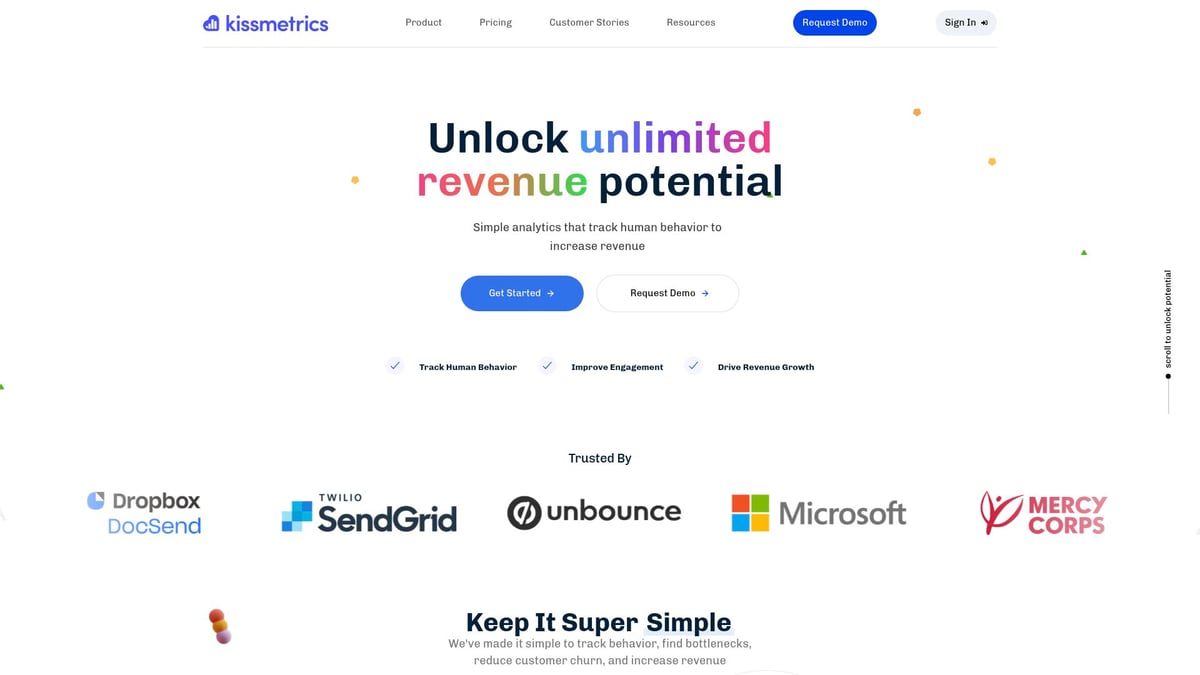
Features include funnel analysis, cohort reports, segmentation, and revenue tracking. Its marketing analytics company platform is tailored for e-commerce and subscription businesses, offering robust retention analytics.
Pros:
- Detailed customer journey tracking
- Revenue-focused reporting
- Designed for recurring revenue models
Cons:
- Higher price point for small businesses
- Interface is less modern
Kissmetrics is a strong choice for companies prioritizing customer retention and revenue analysis from their marketing analytics company solution.
Sprinklr Modern Research
Sprinklr Modern Research is an enterprise-grade marketing analytics company specializing in social listening and sentiment analysis. Pricing is custom, reflecting its advanced, scalable capabilities.
Key features include real-time market intelligence, cross-channel insights, competitive benchmarking, and trend identification. This marketing analytics company leverages AI to monitor brand reputation and analyze a vast range of digital channels.
Pros:
- Comprehensive and scalable
- Strong AI-driven analytics
- Wide digital channel coverage
Cons:
- Enterprise-level pricing
- Complex implementation
Sprinklr Modern Research is ideal for large organizations and agencies seeking a marketing analytics company that delivers deep, actionable social intelligence.
Key Criteria for Choosing a Marketing Analytics Solution
Selecting the right marketing analytics company can make or break your data-driven strategy. With so many platforms available, clear evaluation criteria help ensure your investment delivers measurable results. What should you look for in a marketing analytics company to ensure long-term value and alignment with your business needs?
Alignment with Business Goals and Strategy
Start by ensuring any marketing analytics company aligns with your overall business objectives. Ask yourself: Does the solution support your marketing goals, such as increasing ROI, improving customer retention, or expanding into new markets?
A strong fit means the platform offers features that directly address your unique challenges. Prioritize tools that adapt to your workflows, not the other way around. This alignment lays the foundation for meaningful, actionable insights.
Data Privacy and Compliance Considerations
Data privacy is a non-negotiable requirement for any marketing analytics company in 2025. Look for platforms that adhere to leading regulations like GDPR and CCPA. These frameworks protect customer data and minimize compliance risks.
Robust security features, such as encryption and access controls, are essential. Make sure vendors provide transparent privacy policies and undergo regular audits. Your customers’ trust—and your brand reputation—depend on these safeguards.
Scalability and Integration Potential
As your business grows, your marketing analytics company should scale with you. Evaluate whether the solution can handle increased data volumes and user numbers without compromising performance.
Seamless integration with your existing tech stack is also vital. Confirm compatibility with CRM systems, advertising platforms, and other marketing tools. This unified approach streamlines workflows and maximizes your analytics investment.
User Experience, Support, and Training
A user-friendly marketing analytics company empowers both technical and non-technical users. Look for intuitive dashboards, drag-and-drop features, and clear documentation.
High-quality support and onboarding resources are equally important. Responsive customer service and comprehensive training ensure your team quickly adopts the platform and unlocks its full value.
Customization, Reporting, and Pricing
Customization options—such as tailored dashboards and flexible reporting—let you focus on the metrics that matter most. When comparing platforms, review their reporting capabilities. For a deeper dive into the top reporting tools, visit this marketing report tools overview.
Consider pricing models carefully. Some marketing analytics company solutions offer free tiers, while others require subscriptions or one-time payments. Choose a model that fits your budget and growth plans.
Summary Table: Key Criteria
| Criteria | Why It Matters | What to Look For |
|---|---|---|
| Alignment with Goals | Drives meaningful insights | Feature fit, workflow adaptation |
| Data Privacy & Compliance | Protects customer trust | GDPR/CCPA compliance, security protocols |
| Scalability & Integration | Supports future growth | Tech stack compatibility, flexible data handling |
| User Experience & Support | Ensures adoption and value | Intuitive UI, training, responsive support |
| Customization & Pricing | Maximizes ROI and flexibility | Custom dashboards, transparent pricing |
Real-World Example: Platform Selection in Action
Consider a mid-sized retailer evaluating a marketing analytics company. They prioritized seamless integration with their CRM, robust privacy features, and actionable reporting. After comparing several vendors, they selected a platform that balanced custom dashboards, compliance, and cost—resulting in measurable campaign improvements.
Future Trends in Marketing Analytics for 2025
The marketing analytics company landscape in 2025 is set for rapid transformation. Artificial intelligence and machine learning will become foundational, moving beyond simple reporting to deliver predictive analytics that forecast trends and customer behaviors. These technologies empower marketers to anticipate needs, optimize campaigns, and automate decisions faster than ever. Companies are already leveraging AI-driven platforms to uncover deep insights and unlock value from massive data sets.
Data privacy is another defining force for every marketing analytics company. With third-party cookies disappearing, businesses are turning to zero- and first-party data strategies. This shift puts a premium on capturing consented, high-quality customer data directly from interactions. As regulations tighten, analytics solutions must ensure compliance while maintaining robust insights. For a deeper look at how AI is shaping these changes, see AI-Driven Marketing Analytics Trends.
Real-time personalization and automation are no longer optional for a leading marketing analytics company. Marketers now expect instant insights that drive tailored experiences across web, mobile, email, and social channels. The rise of voice, video, and image analytics means brands can understand customer sentiment and behavior with unprecedented depth. Automation tools powered by analytics streamline campaign execution and adapt messaging on the fly.
Ethical data usage and transparency will define trust in every marketing analytics company. Integrating analytics with broader martech stacks provides a unified view of the customer, fueling holistic strategies. The market is booming, with the US marketing analytics sector projected to see significant growth through 2030, according to US Marketing Analytics Market Growth Forecast. Leading brands are already using AI-powered analytics to anticipate needs and deliver hyper-personalized campaigns, setting new standards for innovation and ROI.